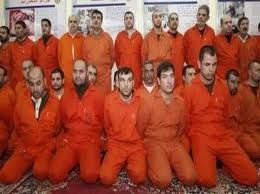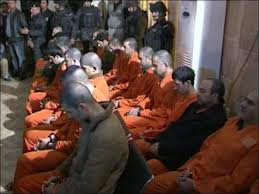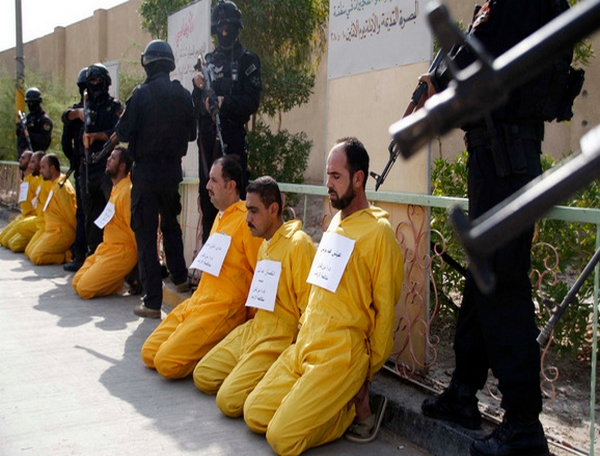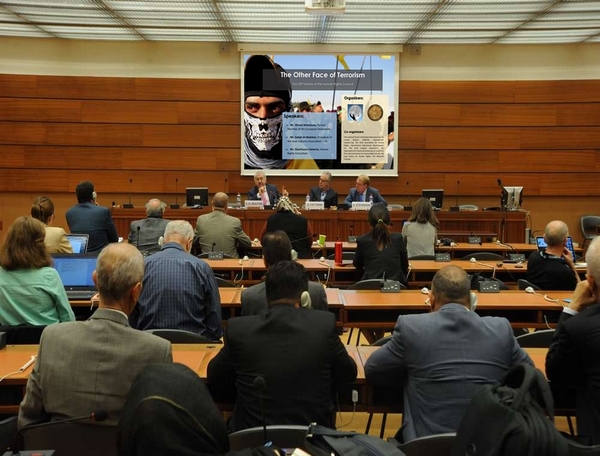Press Release
GICJ Strongly Condemns Recent Executions in Iraq
Geneva, 2 April 2013
Iraqi authorities have once again demonstrated their continued disregard for international law and human rights by resuming their well-known practice of executions.

According to the Iraqi Deputy Minister of Justice, authorities executed 18 “political” prisoners accused of “terrorist activities” over two days, eight on 14 March, ten on 17 March and on 1 April 2013, a further four executions were carried out, bringing the known total thus far to 22. There are reports that another twenty or so will follow in the next day or two. With approximately 129 total executions in 2012, Iraq placed among the top three Executioner-States of the world.
In the case of the first 18 prisoners, it is believed that authorities carried out the executions in a show of power and to avenge the recent attack on the Iraqi Ministry of Justice in Baghdad.1 It is telling that the first wave of executions came on the same day as the attack, 14 March 2013. Regardless of whether or not there is a link between the attack on the ministry and the executions, the fact remains that the Government of Iraq continues to ignore international law and norms, particularly those which protect the right to life.

These executions are part of Iraq’s continuous and escalating practice of violating human rights, which also include a blatant disregard for life, torture, arbitrary detentions, and practically non-existence of fair trials and due legal process. Under Iraqi law, a person can be sentenced to death for some 48 crimes, several of which are non-fatal crimes. It is common practice for detainees to be held without being charged and without any information on their whereabouts being provided. Instead of secret prisons, Iraqis are now referring to “secret prisoners” who are detained without a name being registered and who are kept in undisclosed locations and for unknown periods of time.2
The Iraqi judicial and legal system does not respect life, human rights or international standards. It is flawed and inhumane at all levels, from the initial arrest of a person, to their detention conditions, their methods of interrogation and extracting confessions, to their sentencing without trials and finally, to the execution of prisoners. GICJ has reported on countless of the violations rampant throughout Iraq, including this very issue of executions, lack of due process and use of torture for extracting confessions. There are scores of cases of defendants and detainees being held without charges and many have testified to being subjected to abuse by police and security officials during interrogation for the purpose of extracting confessions, regardless of whether they are true or not. Coerced confession strategies include physical beatings and torture, to threatening a detainee with bringing in their mother or sister and raping them in front of them. A recent report by UNAMI confirms these findings.3 The lack of a just trial system and the methods of obtaining confessions are key points that cannot be ignored or overlooked when discussing executions in Iraq.
The Iraqi government has been quick to defend the recent executions. They claim that all of those executed were “political prisoners” or “terrorists” and in the case of the latest four executions, members of Al-Qaeda. On the official Ministry of Justice (the Ministry) website, Hassan al-Shammari, Iraqi Minster of Justice, reported that the Ministry carried out the death penalty of “four terrorists” on 1 April 2013. He stated that the executions had been carried out according to Para 1, Art. 4 of Counter-Terrorism Law no.13 of 2005, and reaffirmed that the Ministry will continue on its path of carrying out the executions of these terrorists in order to avenge the families of the martyrs and victims. This claim that those being executed are terrorists is commonly used to justify executions, but we must not lose sight of the real issue at hand and that is that everyone, regardless of whether they are thought to be terrorists or not, has the right to due process and a trial. This has not been the case in Iraq for a long time and it holds true now more than ever. As Christof Heyns, UN Special Rapporteur on extrajudicial, summary or arbitrary executions stated in his report confirmed, “any death sentence undertaken in contravention of the Government’s international obligations is tantamount to an arbitrary execution.”4

On a statement posted on the Ministry’s website on 2 April 2013, Minister of Justice al-Shammari assured that those who had been executed had given their confessions through the media, but the reality is that it will never been known how genuine the confessions were since as stated above, torture and threats are commonly used by security and police personnel during interrogations.
GICJ strongly condemns the current executions and persistent violation and disregard of human rights, international law and life that the Iraqi government continues to perpetrate with impunity despite continuous calls by the international community for their cessation. We also find it deeply disturbing and unfortunate that the Iraqi Ministry of Human Rights not only continues to support the death penalty, but actually encourages its expedition with regards to realization. This regrettable view was most recently reiterated on its website on 19 March 2013, but has been made clear countless times before by the Minister himself or by other high ranking officials in the ministry. We agree with Catherine Ashton, EU High Representative, that “capital punishment violates the most fundamental of human rights,” and that the Government of Iraq must “cease all use of the death penalty” and “accede to the Second Optional Protocol to the International Covenant on Civil and Political Rights (ICCPR).5 While we appreciate the EU’s position and statement, we believe that it must take further action on the matter. The EU sustains a working relationship with the current Iraqi government and as such should use all available options to exert real pressure on Iraqi authorities to achieve the cessation of its illegal and inhumane actions. The EU is opposed to the death penalty and in standing by this principle, should take the actions of the Government of Iraq into serious account when considering its relations with them.
A just and fair trial and legal process must be instituted in Iraq, this is of paramount importance when dealing with a country that insists on implementing the death penalty and that does not seem to have the intention to stop at any point in the near future. This intention has been made clear by Minister of Justice al-Shammari on numerous occasions, most recently in an official statement posted on the Ministry website on 2 April 2013 where he stated that all of those who are against the death penalty in Iraq are defending terrorists and that all calls for a moratorium on its use are calls against the rights of the victims and the constitution.6 He further assured that all of the attempts and calls for the end of the death penalty will not keep the Ministry from continuing its work of avenging the families of the victims.
The international community must now also make it clear that it will not allow the Government of Iraq to continue operating outside of international law norms and regulations. As Ms. Navi Pillay, UN High Commissioner for Human Rights, stated with regards to how executions are carried out, they are “extremely dangerous and cannot be justified.” 7 Inaction on behalf of the international community while lives continue to be taken at will cannot be justified either. We call for Christof Heyns, UN Special Rapporteur on extrajudicial, summary or arbitrary executions, to use his mandate to focus on and document this grave violation of the right to life and to uptake an immediate investigation into current and previous waves of executions in Iraq. Furthermore, we strongly urge Ms. Pillay to take increased action on this dire situation. In her statements, Ms. Pillay has mentioned the seriousness of the human rights situation in the country and made calls on the Iraqi government to take action and come into line with human rights and international law. These calls have gone unheeded and the situation continues to escalate. Under these circumstances, further action on behalf of the High Commissioner for Human Rights is not only warranted but necessary.
We further urgently demand that the members of the Human Rights Council convene a special session on the human rights situation in Iraq; that an independent, international committee be created and dispatched to fully investigate all of the human rights violations that have been committed in Iraq since 2003, and also of upmost importance, that a Special Rapporteur on the human rights situation in Iraq be appointed.
------
[1]http://www.france-irak-actualite.com/article-18-prisonniers-politiques-executes-en-mars-a-bagdad-116595920.html
[2]http://dahrjamail.net/
[3]https://www.gicj.org/NOG_REPORTS_HRC_22/ruleoflaw.pdf
[4]Death Row/Iraq: UN expert strongly condemns ongoing executions, reiterates call to halt them, UNOHCHR Press Release, 30 August 2012, http://www.ohchr.org/en/NewsEvents/Pages/DisplayNews.aspx?NewsID=12468&LangID=E
[5]http://www.consilium.europa.eu/uedocs/cms_data/docs/pressdata/EN/foraff/136578.pdf
[6]http://www.moj.gov.iq/view.445/
[7]Responding to human rights report, UN official calls on Iraq to end executions, UN News Centre, 19 December, http://www.un.org/apps/news/story.asp?NewsID=43812#.URUZx6Ow70c
Documenting and reporting human rights violations in Iraq
| Executions | Human Rights Violations in the context of fight against terrorism | Peaceful protests | ||||
 |
 |
 |
||||
 |
 |
 |
||||




